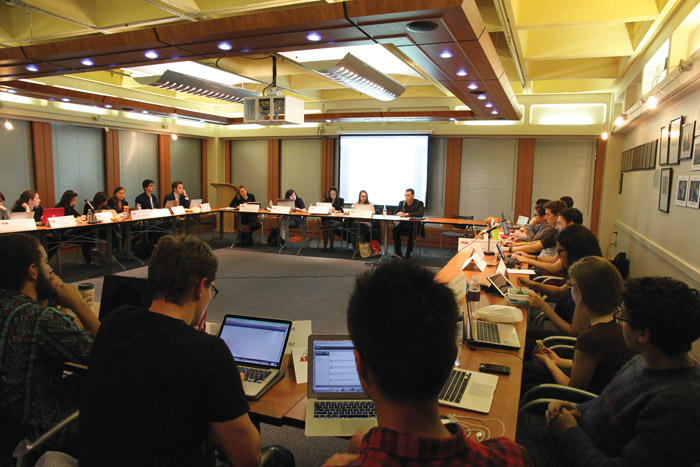Traditional Territory Acknowledgement Statement
Last Thursday, the Students’ Society of McGill University (SSMU) Legislative Council passed the “Motion Regarding the Adoption of a Traditional Territory Acknowledgement Statement,” which requires a statement of acknowledgement over McGill’s physical situation on traditional Kanien’kehá:ka territory be read at all future SSMU Council meetings and major SSMU events.
The motion is similar to a motion of the same name passed by the Arts Undergraduate Society (AUS) Council in late September 2014, and was sponsored by VP University Affairs Claire Stewart-Kanigan, VP External Amina Moustaqim-Barrette, and Arts Senator Kareem Ibrahim.
“It’s a growing practice amongst universities, and McGill has historically been behind in supporting indigenous students,” Stewart-Kanigan said.
“It shows our effort to decolonize education and bring attention to the too often ignored issues facing First Nations communities,” Ibrahim said. “The land McGill occupies is unceded Kanien’kehá:ka traditional territory, also known as the land of the Mohawk First Nation. This is just one step in a very long journey that we have both as an institution and as a larger community here in Montreal to recognize the consequences of colonialism, how we are inherently a part of that process, and how these effects continue today in very prominent ways.”
Cycling referendum
Council also approved a plebiscite question for the second Fall Referendum ballot asking students if cycling should be allowed on lower campus and if SSMU should lobby the McGill administration to allow bikes on campus.
As a plebiscite question, the ballot has no weight beyond gathering data on student preferences, but some councillors expressed concern that the vote would mislead the student body by implying direct change as a result of the referendum.
McGill’s dismount policy, which required bikers to dismount and walk their bikes on campus since May 2010, was met with mixed reactions with the installation of swinging metal gates at the Milton entrance in September 2013. The bike gates were vandalized and faced formal opposition from AUS and SSMU council, leading to their removal in October 2013.
A Cycling Working Group was created to explore possible solutions after this incident. According to the motion, the working group recommended to McGill a “Shared Space” policy be implemented on campus, instead of the current dismount policy.
“Shared Space is an approach to street design that minimizes the separations between cyclists and pedestrians, forcing all mode users to share the space, and where the pedestrian is considered the primary user of the shared space and has the right of way at all times,” read the motion for the plebiscite question.
Conflict of interest regarding councillors’ employment
The Council also voted to allow special permissions to two councillors employed in SSMU operations, who would otherwise be prohibited from being employed by SSMU while on Council as per Bylaw I-2 Article 3.5.
Councillor Zacheriah Houston and councillor Alexander Kpeglo-Hennessy, working at the Student Run Cafe (SRC) and Gerts Student Bar respectively, were granted permission to continue their employment after heavy debate on the floor.
“I’ve always recommended not adding councillors to be employed by the SSMU, for the reason that there could be potential situations where I have to make an intervention with an employee […] who is also above me,” SSMU General Manager Pauline Gervais said.
Issues of conflict of interest were discussed as well as to whether the councillors had intended to pursue employment at the operations run by SSMU prior to being elected into their position at Council.
Event and services finances
VP Internal J. Daniel Chaim also discussed his work on SSMU’s annual Halloween party, 4Floors. According to Chaim, this year’s ticket prices would have to be increased from $15 to $25 per person in order to gain the necessary funds to improve the event from prior years. He explained that the increased price was necessary in order for the event to break even, which it struggled to do last year.
“We spent a while debating financial accessibility and the success of the event,” Chaim said. “It was financial accessibility that was was most in our minds, but we didn’t really didn’t have a choice [….] I’d rather tell people there was a deficit last year and we need to account for that.”
Council also approved the Audited Financial Statements for the 2013-2014 fiscal year. Gerts Bar reported more than $8,000 in profit, which was attributed to increased sales since its renovation two years ago. The SRC reported a $51,000 loss, primarily due to start-up costs such as equipment and training.







